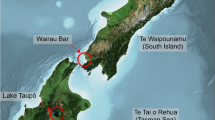Abstract
This Testify article proposes archive as land as an anticolonial methodology for archival and historical research in the field of international relations (IR) and beyond. The article does so by reflecting upon a conversation about the Richard Kekuni Blaisdell Hawaiian National Archive (HNA) with two of the organizers— Dr. Lynette Hiʻilani Cruz and Emilia Kandagawa. Aunty Lynette is a Kanaka Maoli (Native Hawaiian) and Emilia identifies as a Hawaiian national. Their insights into the purpose, building-process, and function of the HNA are deeply rooted in Hawaiian indigenous resistance and movements against U.S. occupation, colonialism, militarism, and other structures of violence and injustice. Analyzing the conversation alongside a rich body of literature on indigenous methodology, this article argues that archival research is land-specific and political and that engaging ethically with the archives—including indigenous-led community archives like the HNA, colonial archives, state archives and more— requires working on relationships that are grounded in the particular location and land-relations of the archive and its sociohistorical and material contexts. Archive as land is a methodology to facilitate this kind of archival work and to assist critical, anticolonial, and decolonial struggles.
Similar content being viewed by others
Notes
I do not claim to do indigenous or decolonial work. By indigenous work, I follow Max Liboiron (2021)’s definition as the “expression of Indigenous sovereignty over Indigenous ways of producing knowledge on Indigenous Lands, by Indigenous peoples” (124). Instead, this article is anticolonial by resisting to reproduce the colonial-extractive mode of archival research and by publicizing indigenous activism of the HNA.
Since April 2023, Ka Lei Maile Aliʻi has become an independent organization.
Biographical information provided by Emilia Kandagawa.
I thank the reviewer for relating this point to the “pretendian problem.” Pretendianism is a phenomenon of false claims to indigenous ancestry and identify, including practices of racial shifting, faking connections and ancestry, and self-indigenizing.
Important exceptions include Grovogui (2016) Beyond Eurocentrism and Anarchy: Memories of International Order and Institutions. Palgrave Macmillan, 2016; El-Malik, S. and Kamola, I. A. ed (2017) Politics of African Anticolonial Archive, Kilombo: International Relations and Colonial Questions. Lanham: Rowman & Littlefield International.
I thank Kenji Cataldo who helped move the boxes and select the files.
References
Appadurai, A. 2003. Archive and aspiration. In Information is Alive: Art and Theory on Archiving and Retrieving Data, ed. J. Brouwer, 14–25. Rotterdam: NAI Publishers.
Barkawi, T. 2023. War and history in world politics. In M. Bukovansky et al. (eds.) The Oxford Handbook of History and International Relations, online publication 16 August, doi: 9780198873457.013.19.
Barker, J. 2021. Red Scare: The State’s Indigenous Terrorist. Oakland: University of California Press.
Brooks, L. 2008. The Common Pot: The Recovery of Native Space in the Northeast. Minneapolis: University of Minnesota Press.
Chang, D.A. 2019. Transcending settler colonial boundaries with moʻokūʻauhau: Genealogy as transgressive methodology. In The Past before Us: Mo’okū’auhau as Methodology, ed. N.W. Hokuwhitu, 94–105. Honolulu: University of Hawaiʻi Press.
Coulthard, G., and L.B. Simpson. 2016. Grounded normativity / place-based solidarity. American Quarterly 68: 249–255.
Davis, S. 2015. The Empires’ Edge: Militarization, Resistance, and Transcending Hegemony in the Pacific. Greece: University of Georgia Press.
El-Malik, S. and Kamola, I. A. (eds). 2017. Politics of african anticolonial archive, Kilombo: International relations and colonial questions. Lanham: Rowman & Littlefield International.
Enomoto, J.L., and D.K. MacKenzie. 2018. Saltwater archives: Native knowledge in a time of rising tides. In Routledge Handbook of Postcolonial Politics, ed. O.U. Rutazibwa and R. Shilliam, 289–301. London: Routledge.
Ferguson, K. E. 2008. Theorizing shiny things: archival labors. Theory & Event 11(4), online publication 16 January 2019, https://muse.jhu.edu/article/257578.
Gani, J.K., and J. Marshall. 2022. The impact of colonialism on policy and knowledge production in international relations. International Affairs 98 (1): 5–22.
Grovogui, S. 2016. Beyond eurocentrism and anarchy: Memories of international order and institutions. New York: Palgrave Macmillan.
Henderson, E. 2017. The revolution will not be theorized: Du Bois, Locke, and the Howard School’s challenge to white supremacist IR theory. Millennium 45 (3): 492–510.
Hawaiian National Archive. 2023. Home, https://www.hawaiiannationalarchive.com. Accessed 1 Oct 2023.
Ka ʻAhahui Hawaiʻi Aloha ʻĀina. 2023. About us, http://www.kahaa.org/about.html. Accessed 1 Oct 2023.
Kandagawa, E. 2023. Emilia Kandagawa, https://www.linkedin.com/in/hawaiialohaaina/. Accessed 1 Oct 2023.
Kawagley, A.O. 2010. Foreword. In: R. Barnhardt and A.O. Kawagley (eds.) Alaska Native Education: Views from Within. Fairbanks: Alaska Native Knowledge Network, Center for Cross-cultural Studies, University of Alaska, pp. 1–5.
Tallbear, Kim. 2013. Native American DNA: Tribal Belonging and the False Promise of Genetic Science. Minneapolis: University of Minnesota Press.
Kolopenuk, J. 2023. The pretendian problem. Canadian Journal of Political Science 56 (2): 468–473.
Krishna, S. 2001. Race, amnesia, and the education of international relations. Alternatives: Global, Local, Political 26 (4): 401–424.
Laffey, M., and S. Nadaraj. 2019. Postcolonialism. In Contemporary Security Studies, ed. A. Collins. Oxford: Oxford University Press.
LANDBACK. 2020. Manifesto, https://landback.org/manifesto/. Accessed 1 Oct 2023.
Leroux, D. 2019. Distorted Descent: White Claims to Indigenous Identity. Winnipeg: University of Manitoba Press.
Liboiron, M. 2021. Pollution Is Colonialism. Durham: Duke University Press.
Mbembe, A. 2002. The power of the archive and its limits. In Refiguring the Archive, ed. C. Hamilton, et al., 19–26. Capetown: David Philip.
Meyer, M.A. 2008. Hawaiian epistemology and the triangulation of meaning. In Handbook of Critical and Indigenous Methodologies, ed. K. Denzin, Y.S. Lincoln, and L.T. Smith, 217–232. Thousand Oaks: SAGE.
Morgensen, S. L. 2009. Un-settling settler desires. In: Unsettling Minnesota Collective (eds.) Unsettling Ourselves: Reflections and Resources for Deconstructing Colonial Mentality.
Sampson, A.B. 2002. Tropical anarchy: Waltz, Wendt, and the way we imagine international politics. Alternatives: Global, Local, Political 27 (4): 429–457.
Sasaki, C. 2022. Pacific Confluence: Fighting over the Nation in Nineteenth-Century Hawai‘i. California: University of California Press.
Sharpe, J. 2020. Immaterial Archives: An African Diaspora Poetics of Loss. Northwestern University Press.
Seth, S. 2011. Postcolonial theory and international relations: a comprehensive introduction. Millennium: Journal of International Studies 40 (1): 167–183.
Silva, N.K. 2017. The Power of the Steel-tipped Pen: Reconstructing Native Hawaiian Intellectual History. Durham: Duke University Press.
Simpson, L. and Klein, N. (2013). Dancing the world into being: a conversation with Idle No More’s Leanne Simpson. YES! Magazine, 6 March, http://www.yesmagazine.org/peace-justice/dancing-the-world-into-being-a-conversation-with-idle-no-more-leanne-simpson. Accessed 1 Oct 2023.
Smith, L.T. 2016. Decolonizing Methodologies: Research and Indigenous Peoples. United Kingdom: Bloomsbury Publishing.
Stoler, A.L. 2010. Along the Archival Grain: Epistemic Anxieties and Colonial Common Sense. Princeton: Princeton University Press.
Styres, S., C. Haig-Brown, and M. Blimkie. 2013. Toward a pedagogy of land: The urban context. Canadian Journal of Education 36 (2): 34–67.
Tannenwald, N. 2007. The Nuclear Taboo: The United States and the Non-Use of Nuclear Weapons Since 1945. Cambridge: Cambridge University Press.
The Freedom Archives. 2023. About, https://freedomarchives.org/. Accessed 1 Oct 2023.
Tuck, E., and M. McKenzie. 2015. Place in Research: Theory, Methodology, and Methods. New York: Routledge.
Tuck, E., and K.W. Yang. 2012. Decolonization is not a metaphor. Decolonization: Indigeneity, Education & Society 1 (1): 1–40.
Vitalis, R. 2005. Birth of a discipline. In Imperialism and internationalism in the discipline of International Relations, ed. D. Long and B. Schmidt, 159–182. Albany: State University of New York Press.
Wilson, S. 2008. Research as Ceremony: Indigenous Research Methods. Blackpoint: Fernwood Publishing.
Women Working for a Nuclear Free and Independent Pacific (WWNFIP). 1987. Pacific Women Speak: Why Haven’t You Heard? Oxford: Greenline.
Author information
Authors and Affiliations
Corresponding author
Additional information
Publisher's Note
Springer Nature remains neutral with regard to jurisdictional claims in published maps and institutional affiliations.
Rights and permissions
Springer Nature or its licensor (e.g. a society or other partner) holds exclusive rights to this article under a publishing agreement with the author(s) or other rightsholder(s); author self-archiving of the accepted manuscript version of this article is solely governed by the terms of such publishing agreement and applicable law.
About this article
Cite this article
Li, R. Archive as land: toward a land-based archival methodology with Lynette Hiʻilani Cruz and Emilia Kandagawa. Int Polit 61, 473–492 (2024). https://doi.org/10.1057/s41311-023-00539-4
Accepted:
Published:
Issue Date:
DOI: https://doi.org/10.1057/s41311-023-00539-4




